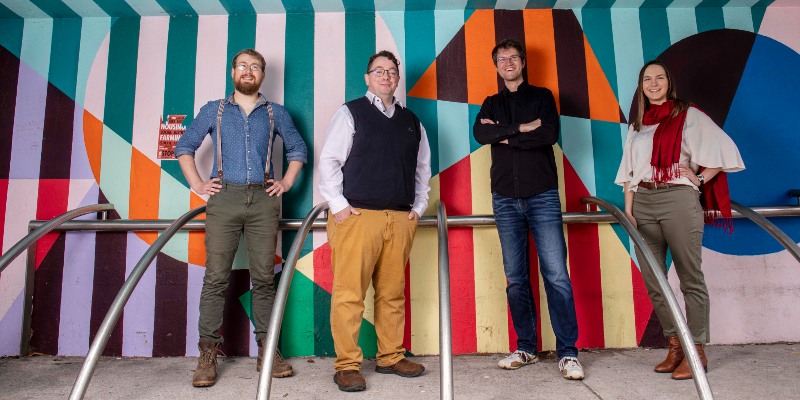In This Section
- Home
- Staff Profiles & Phone Book
- About the Department
- Welcome from Head of Department of Anatomy and Neuroscience
- A History of the Department
- A history of the Department; The early years to the 1980s
- A history of the Department; The move from the Windle Building to BSI and WGB
- UCC Professors of Anatomy and Heads of Department
- The development of the UCC HUB
- Current students, recent research graduates and awards
- Useful Links
- Study Anatomy
- Study Neuroscience
- Research
- Neural circuitry underlying Neuropsychiatric and Neurological Disorders 2026
- Neurogastroenterology 2026
- Developmental Neuroscience and Regeneration 2026
- Neurodegeneration 2026
- Neuroinflammation 2026
- Neuroprotection and Therapeutics 2026
- Neuroproteomics and Molecular Psychiatry 2026
- Anatomy Education Research 2026
- Research Facilities 2026
- Postgraduate Research Programmes 2026
- UCC Anatomical Donations
- Biosciences Imaging Centre
- BSc Medical and Health Sciences
- News & Events
- News Archive 2024
- News Archive 2023
- News Archive 2022
- News Archive 2021
- News Archive 2020
- News Archive 2019
- News Archive 2018
- News archive 2017
- News Archive 2016
- News Archive2015
- News Archive 2014
- News Archive 2013
- News Archive 2012
- News Archive 2011
- BRAIN AWARENESS WEEK 2023
- Department Events and Conferences
- Seminar series 2019_2020
- photo galleries
- Narrowing the void Conference 2023
- Photos of BSc Medical and Health Sciences Mentoring launch 2022
- International Women's Day 2023
- 2023 BRIGHT FUTURES - Celebrating our researchers
- 2023 UCC Futures - Future Ageing & Brain Sciences
- Recent Graduations July 2023
- Anatomy and Neuroscience Top 100 Anatomy Physiology 2023
- BRAIN AWARENESS WEEK 2023 FUN AND GAMES EVENT
- Medical and Health Sciences First year class 2023
- 2023 Brain Awareness week Scientific discussion photo gallery
- World Anatomy Day 2023
- BSc MHS MENTORING PROGRAMME 2023
- BSc Medical and Health Sciences Graduation 2023
- BSc Neuroscience Graduation Photo Gallery 2023
- Dr Kathy Quane Nov 2023
- THANKSGIVING PHOTOS 2012
- Photo Gallery: Society of Translational Medicine Careers Fair 2023
- Photo Gallery:2023 TRAIN AWARDS
- Photo Gallery:2024 Creative Week St Joseph's NS
- Photo Gallery: Department of Anatomy and Neuroscience Thanksgiving Service 2024
- Photo Gallery: Professor Aideen Sullivan farewell party
- Photo Gallery: Irish Pain Society Annual Scientific Meeting Cork 2023
- Photo Gallery: 2024 Medical and Health Sciences Graduation
- Photo Gallery: Medical and Health Sciences Meet and Greet 2024
- Photo Gallery: 2024 BSC NEUROSCIENCE Graduation
- Photo Gallery: 2025 INTERNATIONAL WOMEN'S DAY
- Photo Gallery: 2025 BSc Neuroscience class and staff
- Photo Gallery: 2025 BRAIN CONNECTIONS
- BSc Neuroscience Graduation Photo Gallery 2025
- World Anatomy Day 2025
- UCC Learning and Teaching Showcase 2025
- MSc Human Anatomy Graduation Photo Gallery 2025
- Narrowing the Void Conference 2023
- Department of Anatomy and Neuroscience Contact Us
Microbes turn back the clock as UCC research discovers their potential to reverse aging in the brain.

Research from APC Microbiome Ireland (APC) SFI Research Centre at University College Cork (UCC) published today in the leading international scientific journal Nature Aging introduces a novel approach to reverse aspects of aging-related deterioration in the brain and cognitive function via the microbes in the gut.
As our population ages one of the key global challenges is to develop strategies to maintain healthy brain function. This ground-breaking research opens up a potentially new therapeutic avenues in the form of microbial-based interventions to slow down brain aging and associated cognitive problems.
The work was carried out by researchers in the Brain-Gut-Microbiota lab in APC led by Prof John F. Cryan, Vice President for Research & Innovation, University College Cork as well as a Principal Investigator at APC Microbiome Ireland an SFI Research Centre, based in in University College Cork and Teagasc Moorepark.
There is a growing appreciation of the importance of the microbes in the gut on all aspects of physiology and medicine. In this latest mouse study the authors show that by transplanting microbes from young into old animals they could rejuvenate aspects of brain and immune function.
Prof John F. Cryan, says “Previous research published by the APC and other groups internationally has shown that the gut microbiome plays a key role in aging and the aging process. This new research is a potential game changer , as we have established that the microbiome can be harnessed to reverse age-related brain deterioration. We also see evidence of improved learning ability and cognitive function”.
Although very exciting Cryan cautions that “it is still early days and much more work is needed to see how these findings could be translated in humans”.
APC Director Prof Paul Ross stated that “This research of Prof. Cryan and colleagues further demonstrates the importance of the gut microbiome in many aspects of health, and particularly across the brain/gut axis where brain functioning can be positively influenced. The study opens up possibilities in the future to modulate gut microbiota as a therapeutic target to influence brain health”.
The study was led by co-first authors Dr Marcus Boehme along with PhD student Katherine E. Guzzetta, and Dr Thomaz Bastiaanssen.
Their paper can be read HERE.
Department of Anatomy and Neuroscience
Anatamaíocht agus Néareolaíocht
Contact us
Room 2.33, 2nd Floor, Western Gateway Building, University College, Cork, Ireland
